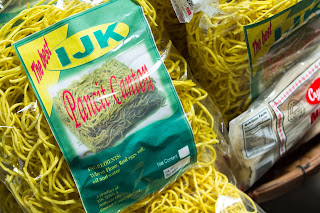| Danilo Papalid's siomai microenterprise has improved his family's life and created jobs for friends and neighbors. |
Sorbetero. Back in 2008, Danilo Papalid of Basak Pardo, Cebu City made ‘dirty ice cream’ using a manual ice cream maker and peddled it from a wooden cart. The work was so difficult that he got sick and had to undergo three months of medication. When he recovered he left ice cream making forever.
For a year he worked as a vendor of siomai (Chinese dumplings), but quickly discovered that he disliked working
for someone else. He saved up
P12,000 before he resigned, used this amount to purchase a trisikad (bicycle with a cart attached), and started his own siomai business. During the first few months he made and sold the siomai himself. He gave the business his own nickname: Papa Danz.
| Papa Danz's siomai comes with a hot and spicy sauce. |
He also made his own sauce. While siomai in Manila comes with soy sauce, calamansi and toasted garlic, Danilo’s siomai comes with a spicy sauce as is common in Cebu. He altered an old sauce recipe and uses TVP (texturized vegetable protein), plenty of garlic and siling labuyo (hot chili pepper) in it. "Siomai fans in Cebu like the sauce hot," he explains.
Creating Jobs. A
series of loans from the Center for Community Transformation Credit Cooperative helped him build up a small fleet of 15 trisikads,
buying them one at a time, about one month apart. The trisikads are equipped with a steamer, a portable stove to keep the siomai warm, an ice box to keep soft drinks cold, and a motorcycle battery and lights for vendors who work into the early hours of the morning.
Each new trisikad meant a new job for a friend or acquaintance. Many of the vendors who work for Danilo are former ice cream vendors he got to know during his ice cream selling days.
“Niyaya ko sila na magtinda ng siomai para sa akin. Sabi ko sa kanila mas sigurado ang kita sa siomai. Ang siomai, malakas kahit mainit, kahit malamig. Pwede yan pang ulam. Pwedeng pangtanghalian, pwedeng pang hapunan, pwede rin pang meryenda. ("I invited them to sell siomai for me. I told them that you earn better income from siomai. Siomai sales are high in cold or hot weather. You can eat it with rice, for lunch, supper or as a snack.”) “Apektado ng climate change ang negosyo sa ice cream" ("Climate change has affected the ice cream business"), Danilo volunteers, explaining that on rainy or stormy days ice cream sales are low, and ice cream makers can only expect to earn much when someone rents a cart or buys ice cream by the canister for a private gathering.
The vendors receive their pay (18% of their sales) every 15th
and 30th of the month. They
earn extra by selling soft drinks and miniature puso, Cebu's 'hanging rice' that is cooked in woven young coconut leaves. Those who work during the day station themselves at the public market and outside schools. Night vendors wait outside internet cafes and night clubs for customers. The jobs have helped to improve the lives of his workers. “Dati gasera lang ang gamit nila, ngayon may kuryente na sila. Dati walang tubig, ngayon may tubig na sila,” he says. ("Their houses used to be only lit with kerosene lamps. They have electricity now, and water as well.")
Another way Danilo has created jobs is by buying puso from his neighbors. He and his wife, Roselyn, used to make the puso
themselves. They would weave the coconut leaves at night and boil the rice in
the early mornings. This left them exhausted and, Danny admits, would make him
hot-headed with the workers. So he decided to buy the puso from neighbors instead. This move means sure sales each day for puso makers in the community.
With ambulant vendors to do the selling, Danilo did the cooking for about a year. In 2014, he trained a nephew to make the siomai and relinquished the job of cooking to him. Today he oversees operations and takes care of purchasing.
Impact on Family. The success of the business
has allowed Danilo and Roselyn to move son James, 10,
to a private school. Daughter Abigail, has the privilege of being in a science class at the local public school, so there is no need to move her to a better school, Danilo says.
Profits have also allowed the purchase of a 75-square meter lot where
a two-story building is nearing completion. He intends to use the second floor as his family’s residence and the
ground floor for business. He was also able to purchase a ¼ hectare piece of rice farm for P70,000
and so far has received profits from four harvests.
Early in 2015 Roselyn gave birth to fraternal twins, Harley and
Harold. Danilo was already starting to sell siomai in Argao, his hometown, at that time. However, because Roselyn could not manage caring for twins alone, expansion had to be temporarily discontinued.
Danilo hopes to keep his business going steadily, knowing how much it
has helped his own family and many others in his community. "Thanks be to God for always being by my side," he says.
Danilo Papalid was a semi-finalist in the 2015 Citi Microentrepreneurship Awards.




